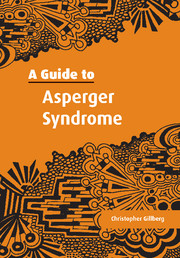Book contents
- Frontmatter
- Contents
- Preface
- 1 Introduction
- 2 Definitions
- 3 Prevalence
- 4 Symptoms in childhood
- 5 Symptoms in adolescence
- 6 Associated psychiatric and social problems
- 7 Other problems
- 8 Strengths
- 9 Background factors
- 10 Cognitive neuropsychology
- 11 Diagnosis and work-up
- 12 Outcome in the longer term: adults with Asperger syndrome
- 13 Attitudes, interventions and treatment
- 14 Who can help?
- 15 What about all those famous geniuses?
- 16 Case vignettes
- Appendices
- Further reading
- Index
14 - Who can help?
Published online by Cambridge University Press: 04 September 2009
- Frontmatter
- Contents
- Preface
- 1 Introduction
- 2 Definitions
- 3 Prevalence
- 4 Symptoms in childhood
- 5 Symptoms in adolescence
- 6 Associated psychiatric and social problems
- 7 Other problems
- 8 Strengths
- 9 Background factors
- 10 Cognitive neuropsychology
- 11 Diagnosis and work-up
- 12 Outcome in the longer term: adults with Asperger syndrome
- 13 Attitudes, interventions and treatment
- 14 Who can help?
- 15 What about all those famous geniuses?
- 16 Case vignettes
- Appendices
- Further reading
- Index
Summary
It would have been easy to suggest a referral pattern for autism spectrum disorders, had there existed a service generally expected to cater to the needs of individuals with Asperger syndrome. However, in the absence of such a service it is not a straightforward issue to outline a chain of helpful societal institutions that would know how to provide good diagnostic and intervention guidelines for people with Asperger syndrome. Asperger syndrome knowledge is still patchy and varies widely according to region, training of professionals and whether or not child or adult services are sought. Even when the knowledge is available, organisational and administrative hurdles are abundant in number, making it almost impossible to overcome all the obstacles on the route to help. It is rare for a diagnosis of Asperger syndrome to be made with confidence before the age of 5–6 years. This is not to say that services and pre-schools/day-nurseries need not be well informed about the condition, but rather that education about autism spectrum problems should be directed to schools and school health services (apart from the health services). In the health services, it is paediatrics, developmental medicine, child psychiatry (particularly child neuropsychiatry), and child neurology that need to be primary targets for educational efforts. However, general practitioners and adult psychiatrists must also be optimally educated. Asperger syndrome is usually a life-long condition and psychiatric problems often ensue. Families, and those affected, may seek help in the general practitioner's office or at the adult psychiatric clinic.
- Type
- Chapter
- Information
- A Guide to Asperger Syndrome , pp. 123 - 127Publisher: Cambridge University PressPrint publication year: 2002



